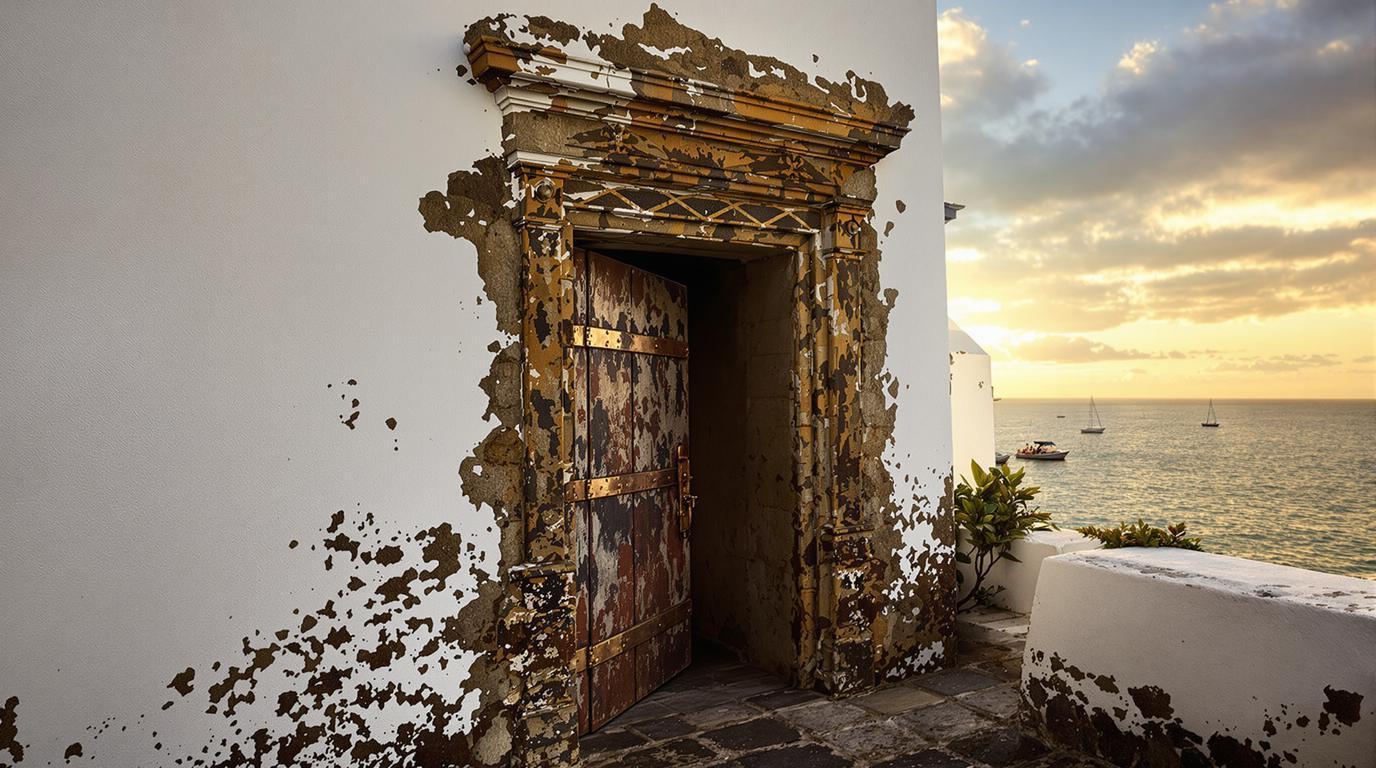Cape Coast’s notorious slave castle stands as a solemn sentinel on Ghana’s shoreline, its whitewashed walls concealing centuries of suffering behind an almost deceptively serene facade. This UNESCO World Heritage site doesn’t just tell the story of Ghana’s colonial past—it forces visitors to confront one of humanity’s darkest chapters while celebrating the resilience that followed.
The Door of No Return: Africa’s most haunting portal
The infamous “Door of No Return” represents the final threshold where countless Africans took their last steps on home soil before being shipped across the Atlantic. Standing before this weathered doorway today creates an almost visceral connection to those who passed through centuries ago.
“When visitors stand at that door, looking out at the same ocean their ancestors saw, something profound happens—history stops being abstract,” explains Kwame Bediako, a local guide who has led tours for over 15 years.
From Swedish trading post to British slave fortress
Cape Coast Castle began as a modest Swedish trading post in 1653 before the British seized control in 1664. What many visitors find surprising is how the castle changed hands repeatedly among European powers—Portuguese, Dutch, Danish, and British—each expanding its capacity for the brutal human trade that would define it.
The castle’s massive stone walls, originally built to protect European trade interests, ironically became the prison walls for those being traded. The contrast between the airy, comfortable quarters of European officers above and the dark, suffocating dungeons below offers a stark physical manifestation of colonial oppression.
Underground dungeons that held 1,500 souls
The castle’s dungeons, where up to 1,500 enslaved Africans were held in unimaginable conditions, create the most powerful emotional impact. The small, fetid chambers with their low ceilings and minimal ventilation housed hundreds at a time, many dying before ever reaching the ships that would carry others across the Atlantic.
“We ask visitors to stand in silence for just one minute in these dungeons. Even that brief moment becomes unbearable for many—now imagine months,” shares museum curator Esi Sutherland.
Where education meets emotional reckoning
While dramatic landscapes often define historic sites, Cape Coast Castle’s power lies in its emotional impact. The museum thoughtfully contextualizes the slave trade without sanitizing its horrors, using artifacts like shackles, documents, and firsthand accounts to educate rather than simply shock.
Beyond the castle: Cape Coast’s vibrant present
After the emotional weight of the castle tour, Cape Coast town offers a striking counterpoint with its colorful fishing boats, bustling markets, and beautiful beaches that rival better-known coastal destinations. Local restaurants serve fresh red snapper and fufu (pounded cassava) that provide a literal taste of Ghana’s culinary heritage.
A perfect day trip from Accra
Located approximately three hours from Ghana’s capital, Cape Coast makes an ideal day trip, though staying overnight allows visitors to experience the town’s rhythm beyond the castle. Unlike some overcrowded African tourist destinations, Cape Coast maintains an authenticity that connects travelers to both history and contemporary Ghanaian culture.
Why this matters now: confronting difficult histories
In an era when societies worldwide are reassessing their relationships with colonial histories, Cape Coast Castle stands as a model for how difficult histories can be confronted directly. While some historic towns preserve their heritage as celebration, Cape Coast’s approach balances commemoration with education.
“This isn’t just African history or European history—it’s human history. The castle belongs to all of us, as does the responsibility to remember,” notes historian Dr. James Anquandah.
For those tracing the African diaspora’s origins or seeking to understand colonialism’s impact, Cape Coast provides unparalleled insights. While medieval villages might reveal the beauty of preserved history, Cape Coast reveals history’s complexities—the darkness of human cruelty alongside the triumph of survival and cultural persistence.
Standing on Cape Coast’s shores today, watching fishermen mend their nets in the shadow of the castle, visitors witness Ghana’s remarkable ability to acknowledge painful history while crafting a vibrant future. This duality makes Cape Coast not just a destination of historical significance, but a place of profound human reckoning that transforms all who walk through its doors.
